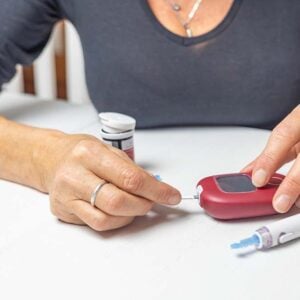
The SHOCKING Link Between Diabetes and Your Mind
We’ve all been there. Feeling down, anxious, or just “off.” And what do we often tell ourselves?
“It’s just a bad day. I’ll get over it.”
“I just need to toughen up.”
“It’s all in my head.”
But brushing off your mental health could be putting your physical health at serious risk. Especially if you’re one of the millions of Americans living with diabetes.
A groundbreaking new study has uncovered a shocking link between mental health and diabetes that Big Pharma doesn’t want you to know about.
Here’s the bombshell: Mental health disorders INCREASE your risk of developing chronic diabetic complications.
And it also works the other way around. Those nasty diabetes complications? They can trigger mental health problems. It’s a vicious cycle affecting people with diabetes of ALL ages.
Does this suggest depression could worsen diabetes? In a word, yes.
Let’s break down this eye-opening research: Scientists looked at over 196,000 people with diabetes (both Type 1 and Type 2) and compared them to more than 356,000 who were diabetes free.
What they found was shocking…
Having diabetes complications TRIPLES your risk of developing a mental health disorder if you’re over 60. If you’re under 19 and have a mental health issue, you’re two and a half times more likely to develop diabetes complications.
This nasty two-way street exists for all age groups, whether you have Type 1 or Type 2 diabetes.
And here’s the kicker—type 2 diabetics had an even higher risk of mental health problems compared to Type 1 diabetics.
You see, for too long, we’ve treated the mind and body as separate entities. But this research proves what I’ve been saying for years: Your mental and physical health are intimately connected. Ignore one, and you’re putting the other at risk.
So, what can you do about it?
Don’t brush off your mental health. If you’re feeling depressed, anxious, or overwhelmed, seek help. It’s not a sign of weakness—it’s a sign of strength.
If you have diabetes, be extra vigilant about your mental health. Regular check-ins with a mental health professional should be part of your diabetes management plan.
Practice stress-reduction techniques like meditation, deep breathing, or yoga. These can help both your mind AND your blood sugar levels.
Exercise regularly—it’s good for your body, blood sugar, and mood. And be sure to eat a healthy, whole-food diet. What’s good for your body is good for your brain, too.
Lastly, get enough sleep. Poor sleep can mess with your blood sugar and your mental health.
To do that, you need to support a healthy circadian rhythm by getting plenty of light exposure during the day (especially early in the morning) and avoiding exposing yourself to too much artificial light at night.
The fact is, managing your circadian rhythm is JUST as critical for your metabolic health as diet.
In fact, it’s so vital to our well-being that I’m working on an entire circadian rhythm protocol to help folks get theirs back on track. I’ll share more details about it in the next few weeks, so be sure to watch for it.
Remember, taking care of your mental health isn’t a luxury—it’s a necessity. Especially if you’re living with diabetes.
Don’t let anyone tell you it’s “all in your head.” Your mind and body are connected in ways we’re only beginning to understand.
P.S. The incredible payoff for delaying diabetes… learn about it here.
SOURCE:
Maya Watanabe, Evan L. Reynolds, Mousumi Banerjee, et al.; Bidirectional Associations Between Mental Health Disorders and Chronic Diabetic Complications in Individuals With Type 1 or Type 2 Diabetes. Diabetes Care 27 August 2024; 47 (9): 1638–1646.
Written By Dr. Richard Gerhauser, M.D.
For years he’s been the trusted doctor for celebrities, world-class athletes, and countless seniors looking to reclaim their health.
And now…for the first time ever… he’s making his medical breakthroughs available to readers all across America.
Dr. Richard Gerhauser, M.D. is one of the most pioneering and innovative minds in medicine today – and he delivers cutting-edge cures each month through his Natural Health Response newsletter.
Natural Health Response readers get full access to Dr. Gerhauser’s protocols for chronic pain… heart disease… diabetes… Alzheimer’s… and even cancer. These are the very same treatments Dr. Gerhauser recommends to his own patients at his practice in Tucson, Arizona.
In addition to being a board-certified medical doctor, Dr. Gerhauser has earned two master’s degrees and has served as a clinical professor at the University of Arizona.
And as a physician at the world-famous Canyon Ranch, Dr. Gerhauser treated celebrities from around the world who paid dearly for the type of next-generation health information he provides Natural Health Response readers each month.
View More Free Articles
5 Ways to “Beat the Bloat” This Thanksgiving
As we prepare for Thanksgiving week, there’s a lot to look forward to and be thankful for. Family gatherings, football games, great food, and even better desserts top the list. Then there are all the leftovers. It’s not a holiday that’s known for moderation. But if you’re not careful, overdoing it on Thanksgiving could leave […]
Eat THIS to Reduce Your Risk of 14 Cancers
I’m a meat-and-potatoes guy. I’ll never turn down a big, juicy steak. But even more than that… I’m a fish guy. There’s not much I like more than a perfectly grilled salmon. I hope you do, too, because salmon contains two potent nutrients tied to a reduced risk of 14 types of cancer. Omega-3s are […]
The Bad Habit Robbing YEARS from Your Life
I often get eye-rolls when I stress just how essential lifestyle factors like light reducing pollution and grounding are good for health. But new research continually proves that I’ve been right all along. Today, a critical new study shows that something I’ve warned you about for YEARS is tied to a 34 percent increased risk […]
Reduce Colon Cancer Risk by 30%
More than 150,000 people are diagnosed with colorectal cancer yearly. Another 35,000 will get a liver cancer diagnosis. But if you have type 2 diabetes, your risk of developing one of these skyrockets—a 47 percent increased risk of colorectal cancer, and a two to three times higher risk of liver cancer. That’s why I’m excited […]
“Dinner Plate” Danger Raises Prostate Risk
Did you know that prostate cancer is FAR more prevalent in developed parts of the world than in less developed regions? Strange right? What is it about our modern, developed society that’s attacking our male population? There are MANY answers to this question. The primary one I will focus on today is a significant environmental […]
The 5-Minute Solution to Better Blood Pressure
Are you one of the millions who battle the so-called “silent killer” hypertension? And do you have five minutes to spare daily? If so, you could be well on your way to significantly healthier blood pressure. Sound too good to be true? A new study proves it. And the best part? It’s incredibly easy If […]
“Eye-Opening” Benefits of Pistachios
Imagine if there were a daily snack that could protect your vision. Well, a recent study brings good news for the 20 million U.S. adults already battling macular degeneration—the leading cause of vision loss for those over 60. Adding a handful of pistachios to your diet might help shield your eyesight. Let’s take a “look.” […]
Get Better Blood Sugar This Holiday Season
Let’s face it. The holidays are NOT good for your waistline… or your blood sugar levels. Potlucks, family dinners, cookie exchanges, Christmas parties… you know the drill. So, if you’re one of the 98 million people on the brink of type 2 diabetes, it’s VITAL to take steps to manage your blood sugar levels as […]
Common Vitamin Is a Hidden Colon Cancer Shield
With aggressive colon cancer on the rise in younger people, I’m always on the lookout for research showing how we can all lower our risks. Over the past few months, I’ve shared studies showing that stress, oral bacteria, obesity, and circadian disruption are all tied to colon cancer. And just last week I revealed how […]
Ditch Dieting for Better Blood Sugar Control
I’ll just say this right upfront… Type 2 diabetes is a lifestyle issue. And while diet is PART of the equation, it’s not the only thing to consider when managing your blood sugar. Over the past few months, I’ve highlighted research showing that factors like your bedtime and activity levels impact diabetes risk. Today, I […]










